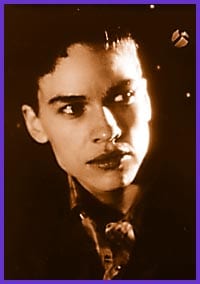There are tons of brilliant homo pix to choose from at this year’s Toronto International Film Festival, including some great Canadian films. Here’s a list of must-buy tix – Canucks first, then the world beyond.
Written, directed and co-produced by local boy Jeremy Podeswa, The Five Senses is a brooding rumination on our faltering attempts to connect. Structured as five interlocking stories set in Toronto, various characters collide due to a particular sense: An asocial girl meets up with a voyeuristic young man with a predilection for things queer; an obsessive bisexual (Daniel MacIvor) thinks he knows what love smells like; an eye doctor goes deaf; a cake-maker prefers appearances to taste; a widowed masseur forgets how to touch her daughter.
If the structure sounds artificial or forced, the film is anything but, due to Podeswa’s writing and the strong performances he elicits from an amazing ensemble.
The Five Senses serves up a smorgasbord of the fears and hopes we project onto others. It argues that the only way to break out of our individual physical shells is through faith – in God, in yourself or in love – either that, or retreat into a dark and lonely place.
Sophisticated and accomplished, it’s only too proper that Podeswa’s film opens the Perspective Canada series. He heads up an amazingly strong roster of queerly Canadian filmmakers.
(The Fri, Sep 10 gala screening will surely sell-out; so watch for the film’s theatrical release around October.)
The next must-buy ticket is for the homo program of shorts. Not only is this the best chance to see most of these flicks (some may make it onto TV, but the rest will be banished to the fest circuit), but the evening also has great stuff.
Of the films I screened, my fave from the program is Hope Thompson’s half-hour, crime drama, Switch. Miles ahead of her previous outing, It Happened In The Stacks, Thompson has now perfected the short mystery with style and panache.
It’s 1949. Two telephone operators (Erin McMurtry and Kirsten Johnson) cannot resist the pull of a gay bar called the Tender Trap. They become unsuspecting participants in a dangerous scam orchestrated by a hoodlum boyfriend (Ed Roy).
Thompson’s visual approach is very much her own, especially the editing (co-edited with Josie Massarella), which conveys delicious tension while focussing on such queer details as: black red lips, pale flesh, blue light, thick lipstick, the fleeting gesture of a gloved hand, a heaving bosom and Bitch Diva.
Finally, someone figured out how to translate the musical and comic talents of Michael Fitzgerald to the silver screen. Bravely Ann-Margret meets Michelle DuBarry, the Bitch gives a star performance. And Ms Diva can really sing; nothing beats it.
Another strong local showing (in the same program) is Quiver, a five-minute, dark, little gem written, directed and produced by Toronto’s Scott Beveridge. It’s an uncompromising and evocative journey into rough sex and a tough outlook on life.
Quiver is about a young man (Mark Thompson) who likes to get beat up by a lover or hooker or trick (Gerald Hannon) – we’re never sure who he is. Nor are we sure about the narrator’s point of view, with references to imploring looks from an AIDS patient. Is the young man the nurse, or the patient?
Instead of assurance, viewers are left to decipher the fine, elusive script and the hard-hitting scene. The film is a challenge to anyone (or any agency) presumptuous enough to judge the hidden forces at work in the minds of men confronting daily violence and death.
Other shorts in this program include Hi, I’m Steve, by Robert Kennedy: A man goes to desperate and laughable lengths to meet someone on Cruiseline. Then there’s Where Lies The Homo?, a personal coming-out, coming-of-age after AIDS diary illustrated by images and clips from classic flicks, TV shows, archival materials and home movies. I’m sure the audience will squeal with delight at recognizing the same fave and despised cinematic moments – from Audrey Hepburn to Cruising – but I personally found the film disappointing because the writing was a little too familiar (we’ve heard it before) and a way too rambling. Also on the program is Below the Belt by Laurie Colbert and Dominique Cardona, about two 17-year-old sparring partners reappraising the mother-daughter bond; and The Offering, by Paul Yee, a short drama without dialogue that follows the enigmatic relationship between a Buddhist monk and a novitiate.
If you are looking for laughs and lurid melodrama, look no further than Top Of The Food Chain, the latest feature from Winnipeg-native John Paizs.
“Shall we do the copulatory act?” asks a strange blonde with a killer smile. Something wicked has come to Exceptional Vista, the desolate home to a precocious and vaguely incestuous young woman, her slow, cute and twisted brother, an atomic scientist (Campbell Scott of The Spanish Prisoner) who dreams of “vaccines for over-crowding, narcolepsy and horn in the head,” and a suspicious travelling salesman working “Bladder Town, Left Hemisphere, Dunk, Right Hemisphere, Walk-A-Dog-A-Thon and Fetus.”
I don’t know if you can call John Paizs a queer filmmaker, but his films are divinely odd – and Top Of The Food Chain is a shot right out of the gay cannon. The gut-splitting sci-fi, horror spoof is packed with surreal, non-sequitor humour, campy performances and cinematic wit. Equal parts Star Trek (the old TV series), Invasion Of The Body Snatchers and The Manchurian Candidate, Top Of The Food Chain filets bare the homoeroticism of buddy and slasher flicks and a host of other film conventions.
I won’t give a way any surprises, but there are more than enough bent twists and belly laughs to make this flick a must-see.
Another lurid melodrama is Full Blast, a French-language drama by Rodrigue Jean. Set in a small New Brunswick lumber town, Full Blast details the relationship between three young men and the women in their lives. Against the backdrop of a strike, one of the friends Charles (Patrice Godin), returns to town, lonely and looking for the familiar love – and not so familiar, if you know what I mean – of his home-town buds.
With some great moments and a real sense of claustrophobic small town dynamics, Full Blast is almost a great film – problem is, the guys are all impossibly good looking (though that doesn’t hurt the sex scenes).
Carl Bessai’s debut feature, Johnny, is bold and brave in terms of style and substance. The title character (played by Chris Martin) is an ambiguously sexual squeegee kid who is unambiguously an asshole. Bessai quickly establishes a personal style; the film’s jagged hand held camera and unnerving transitions seem perfectly suited to life on the streets.
The characters feel real and, at its best, Johnny approaches the impact of Lars Von Trier’s work (whom Bessai mentions in the credits).
But the slice of street life flick soon gets pushed aside with the introduction of a video camera and Johnny’s subsequent need to tape everything and make “scenes.” I found this storyline totally out of place. But with some kinds of filmmaking, go big or go home. Johnny is a daring attempt at tackling tough, contemporary issues.
Other Canadian flicks at this year’s fest (which weren’t available at press time but will certainly be on somebody’s must-buy list) include veteran lesbian filmmaker Léa Pool’s most autobiographical film to date, Emporte-Moi, about a young girl coming of age within a tumultuous family.
Then, five young friends unleash secret emotions (including one guy’s sexual confusion) after the breaking into an amusement park in Rollercoaster, by Vancouver’s Scott Smith.
And Toronto based Christine Richey opens a door onto the world of SM in Tops And Bottoms, drawing a connection from the Marquis de Sade to present-day sex.
In all, these film illustrate that queer cinema represents some of the finest filmmaking this country has to offer. The depth of talent, breadth of subject matter and range of styles will have critics and audiences, here and abroad, sitting up and taking notice.
Tix for each screening are $11.77; for galas, $21.40. The official schedule is available on Tue, Aug 31; the catalogues should be available now.
There’s a new ticket regimen in place this year. You can drop off your ticket requests beginning Thu, Sep 2 (allow four days for processing). In person, ticket orders begin Wed, Sep 8.
Passes and coupon books can be ordered on-line at www.bell.ca/filmfest.
The box office is at College Park (444 Yonge St, main level), open Monday to Saturday from 10am to 6pm. From Mon, Sep 6, it’s open seven days a week from 9am to 7pm.
For info, call (416) 968-FILM.


 Why you can trust Xtra
Why you can trust Xtra


